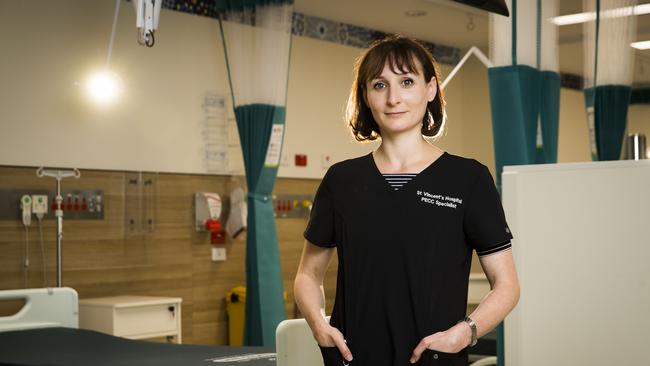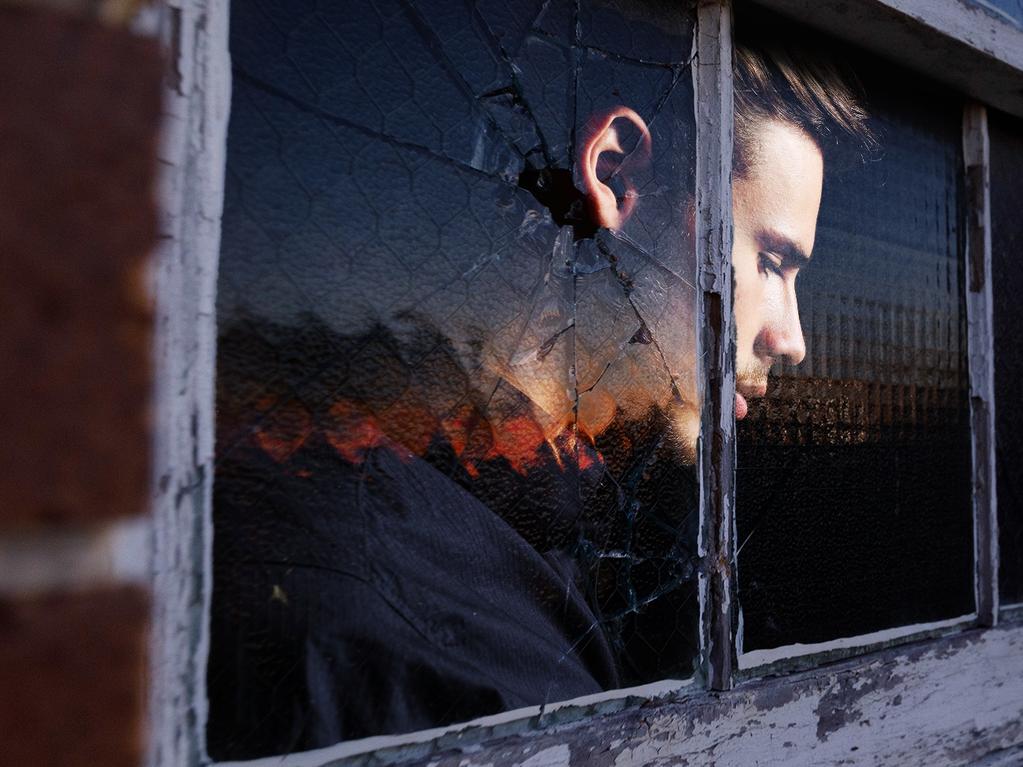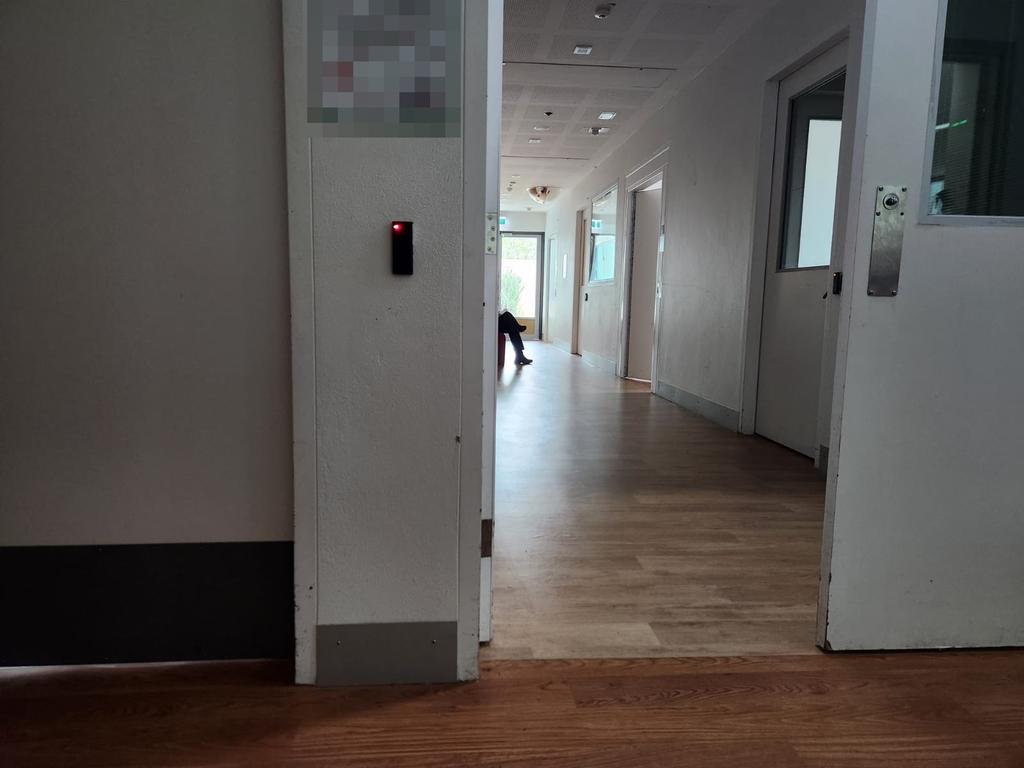Code red for mental health as psychiatrists walk off the job
About two-thirds of NSW public hospital staff specialists say enough to a system in crisis.

The showdown this week between desperate and burnt-out psychiatrists and the NSW Ministry of Health is another symptom of the depth of the faultlines affecting public health systems, not only nationwide but also internationally.
It isn’t only psychiatric wards and clinics but also maternity units, radiology departments and entire regional hospitals that are on the brink. Many doctors are one step from walking away from the public system. Those who remain pare back their hours. Critically understaffed, wards are overflowing; patients line the halls of perpetually overcrowded emergency departments.
In NSW, an extraordinary 175 and rising out of the state’s workforce of 260 public hospital staff psychiatrists have handed in their resignations. The government is wedged. It has just given big pay rises to paramedics and police. It is facing industrial demands on every horizon. It is flailing, with no evidence of a credible management plan as the looming workforce exodus threatens to collapse the system.
Doctors are not a particularly industrially inclined group. In public hospitals, junior doctors routinely work grinding hours of unpaid overtime as they inch their way to specialist status. Even the most senior specialists, with decades of experience, work for amounts of pay for on-call shifts that would make your eyes water – and not because it’s a lot. Their on-call weekend rosters are drawn up in a fashion that ordinary people may think should be illegal. Friday 5pm to Monday 8am, variously first or second on call, most of it continuous and usually barely any of it spent actually asleep.
For all of this, doctors who have trained for 15 years just to qualify as specialists may be paid barely more than a few hundred dollars.
I’m not saying doctors in general are not part of a well-remunerated profession. What I am saying is the public system is squeezing some of our most highly trained professionals who choose to work in the public system dry. The stone can give no more blood. Even those who are among the most altruistic in the profession, such as public sector psychiatrists, cannot abide the conditions any more. The work intensity, especially in psychiatric wards and emergency departments, has become such that patient safety is compromised.
When this overstretched system breaks down and things go wrong, the system covers up its own mistakes, perpetually shifting blame. Senior bureaucrats fiddle elective surgery metrics to cover up failure, and if any honest doctor blows the whistle they’ve been known to find themselves before an effective star chamber facing invented or at least twisted allegations. Careers are destroyed for no good reason, years of training and good intention laid to waste. This is the price of standing up against a toxic system.
Nobody should be surprised that amid this rot it’s NSW staff specialist psychiatrists, who look after the most marginalised in our society, who are leading an uprising. Pramudie Gunaratne, chairwoman of the NSW branch committee of the Royal Australian & New Zealand College of Psychiatrists, is confining her comments to psychiatry, but says mental health wards are in crisis. “I really encourage our politicians to spend a day in one of our state’s mental health wards or a night in an emergency department where police and ambulances are bringing patients in for urgent mental health care. Perhaps then they will understand the depth of this crisis.
“Families desperate for care need more than empty platitudes from the government - we need real solutions. Without a workforce, we do not have a mental health system. The system has been deteriorating over time and we will not be able to keep our essential staff without urgent action.”
Psychiatrists are by no means the only ones who have worthy pay demands across the gamut of healthcare, but the current situation is extraordinary. There are 450 psychiatry staff specialist positions in NSW. Only about 260 of them are filled. Of those, about 150 resolved at an extraordinary meeting on Monday night to resign en masse amid a dispute over pay and resourcing. It was not an idle threat.
All of the 150 staff specialists proceeded to do so by a Friday deadline, and more joined them as outrage grew over the NSW government’s handling of the crisis. Now the number of resignations looks set to reach more than two-thirds of the workforce as the NSW government digs in and doctors’ fury grows. Registrars are standing side-by-side with their senior colleagues, terrified at the tsunami that is to come if staff specialist are largely absent from wards. “These resignations are a disaster,” one senior doctor says, observing the unfolding situation. “It’s almost at national emergency level.”
The dispute is over a workforce and retention crisis. Staff specialist psychiatrists have watched during the past two to three years as a vast staff exodus from the public sector in NSW has gathered pace. Staff remaining are burnt out and suffering what is described as moral injury attempting to provide therapeutic care in a system that is unable to foster the conditions to enable such care to be provided.
Mental health systems nationwide have been neglected and underfunded for decades, as documented by The Australian this month in its series Cast Adrift and in a policy report with the Australian National University.
Psychiatrists in Victoria and Queensland are paid about 30 per cent more than their NSW public hospital counterparts. About a third of public sector psychiatry workforce shifts in NSW are being staffed by locums at great expense to taxpayers. Trainee psychiatrists, learning their craft in the ruins of our public hospital system, have no intention of spending a career in the public system; only 20 per cent plan to remain after their training.
Psychiatry is the only specialty that can’t fill its training places. Other specialties are extremely competitive and oversubscribed. Staff specialists are desperate to retain sorely needed junior professionals. They’re now willing to do whatever it takes.
“We feel completely let down by the government that they don’t understand, or they choose not to understand, the chronic staff shortages that exist,” says Ian Korbel, a consultant forensic psychiatrist and chairman of the mental health staff committee at Justice Health.
“They choose to not understand that the community mental health teams across the state are barely functioning,” Korbel says.
“We have teams where there are 500 patients on their books that are being serviced by three days of psychiatry from a locum. It’s not even close to a standard that anyone would agree to. That is why people leave. People just have what’s been described as a moral injury from working in these conditions. Wards are not as safe as they should be. We have patients who have had a lot of trauma in their lives, and they see the wards as punitive. It’s not minor trauma that these people have had.
“Because of inadequate funding of beds, the wards have become places where only involuntary patients are, there very few voluntary patients left. These are patients who have psychotic disorders, who are at risk to themselves or at risk to others. That means the people who work in them are put at risk, and that risk must be managed.
“These are not always therapeutic places. There are times where staff or other patients are assaulted in those wards.
“There’s no getting away from that, but we’re trained and willing to do that because these patients are also the most vulnerable people in society. They have a terrible mental illness. It’s not their fault, and it’s a measure of our society that we treat those with the most vulnerable conditions, and resource these wards and the people that staff them, adequately. That’s where NSW is letting down ourselves because it’s our family, it’s our friends, it’s our cousins, it’s our brothers who are the patients.”
Across the past 15 months, public sector psychiatrists have been attempting to force the NSW government’s hand to offer better salary packages to stem the staff flight from hospitals. The Covid-19 pandemic and the rise of private telehealth medicine that it spawned turned a deep divide between the salaries that could be commanded in public and private psychiatry into a yawning chasm. Some psychiatrists are charging several thousands of dollars for single ADHD assessments, in what their public sector colleagues characterise as gross profiteering.
At the same time, mental health system reforms in Victoria and Queensland brought sizeable boosts to staff specialist salaries. Queensland is even offering a sign-on bonus of upwards of $50,000 for those who join the state’s health service from interstate. It leaves NSW public sector psychiatrists coping with the double blow of watching as the registrars they have trained walk away from the public system, as the under-resourcing ratchets up the stress as patient loads become untenable, more and more complex, and frequently violent.
“This is not about a pay rise and never was,” says Angelo Virgona, former NSW branch chairman of Royal Australian & New Zealand College of Psychiatrists. “This has always been about a workforce crisis, within a system in crisis. This is about saving the system, about attracting people to work in the system and retaining those good people who are left.”
The staff psychiatrists have been asking for a 20 to 25 per cent pay rise as part of a special deal to address the workforce retention crisis. It would replicate such a deal that was offered to emergency department staff specialists about a decade ago when their system was similarly on the brink.
Separately, award wage negotiations have been ongoing between the NSW government and all healthcare workers, with all staff specialists seeking a rise to their award of 10.5 per cent over three years in May this year, which was rejected. The industrial situation has become extremely messy. The NSW government, having just agreed to the paramedics and police deals, now has little room to move as one deal will trigger off demands across several public service systems like a column of dominoes.
The NSW government has not been willing to meet staff specialists’ demands for a one-off extraordinary pay rise to address the workforce retention crisis and bring NSW to parity with Queensland and Victoria. Instead it has been offering solutions that would streamline workers’ productivity and lead to efficiency gains.
Insiders at the Ministry of Health report that discussions are being had as to how the system may be able to cope with a vastly reduced pool of staff specialist psychiatrists. It’s a highly concerning prospect. Legislative changes could mean that decisions on scheduling patients might not have to be ticked off by a psychiatrist. If a social worker or nurse were able to make such a decision, it would radically change the game about treatment decisions. The skill set involved in making grave decisions such as those that deny patients their liberty is possessed only by a highly trained psychiatrist, the profession argues.
Unfortunately, the untenable pressure the mental health system is operating under largely is seen only by patients and those doctors who remain, who are often working behind closed wards. The patients concerned are often voiceless. They’re by and large severely unwell and marginalised. Most of them will never speak of their experience in involuntary wards. Those who do often describe them as places of horror.
The horror is endured daily by the brave souls who as doctors have chosen psychiatry as their specialty but who now are handing in their notice en masse. Most don’t want to terminate the jobs they love. Emergency doctors are watching the psychiatry workforce uprising in NSW with trepidation. It’s their wards that will be swamped if the crisis that has prompted the resignation of almost half the entire staff specialist workforce of psychiatrists is not resolved. And all patients will suffer.






To join the conversation, please log in. Don't have an account? Register
Join the conversation, you are commenting as Logout